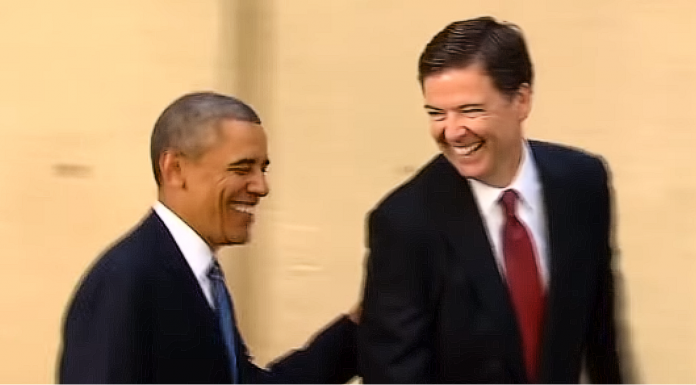A declassified January 2017 memo from then-FBI Director James Comey to then Director of National Defense James Clapper showed that both top intelligence officials were aware of the problems surrounding the Steele Dossier.
“[W]e are not able to sufficiently corroborate the reporting to include it in the body of the report,” Comey acknowledged in the memo, while nonetheless trying to argue for ex-British spy Christopher Steele’s reliability as a source.
“… It might be better to say that ‘we have not be able to sufficiently corroborate the information to include it in the body of our Russia report but, for a variety of reasons, we thought it important to include it in our report to our senior-most audience,'” he wrote.
With Comey’s blessing, the FBI continued using the dossier for months afterward to spy on then-President Donald Trump‘s campaign advisers and administration officials.
In fact, the Jan. 12 memo was dated the very same day that Comey signed off on approving the first renewal of the warrant application seeking permission from the secretive Foreign Intelligence Surveillance Court to spy on Russian policy expert Carter Page.
The FBI’s top brass continued authorizing the FISA renewal applications, two more times, in April and June. The FISA court then rubber-stamped the surveillance applications, even after Comey had been fired in May and Special Council Robert Mueller was appointed to take over the “Crossfire Hurricane” probe into Russia collusion.
An internal follow-up investigation by the Justice Department’s inspector general identified at least 17 significant errors in those applications.
The exchange between Comey and Clapper—just over a week before Trump’s inauguration—came during a flurry activity from the Obama administration in its efforts to undermine the incoming president.
Much of the plotting that occurred during the last few weeks of Obama’s lame-duck session ultimately took the entirety of Trump’s first presidential term to piece together due to the classified nature of the materials, which deep-state officials have resisted releasing for fear of further damaging the intelligence community’s public standing.
For example, Just the News’s John Solomon noted in his reporting on the Comey memo that the CIA already had advised Obama officials, based on the warnings of Britain’s MI6 agency, that Steele was unreliable.
The FBI had, itself, fired Steele as an informant after he was caught shopping around his anti-Trump dossier reports to far-left publications such as Mother Jones.
The leading intelligence agencies also were aware that Steele’s primary sub-source—himself a suspected Russian agent—had disavowed the substance of the dossier reports.
Moreover, the agencies also knew that Steele’s work had been commissioned by the Hillary Clinton campaign. And they knew that Clinton had authorized the effort to discredit Trump with Russia-collusion claims in order to deflect from her own FBI scandal involving the mishandling of classified emails.
Comey’s Jan. 12 memo was obtained by a Freedom of Information Act lawsuit by the Southeastern Legal Foundation.
During his last week in office, Trump declassified many of the documents related to “Crossfire Hurricane” and related investigations.
But Solomon, a leading conservative investigative journalist, has said many more have yet to be released by the intelligence agencies.
It remains to be seen whether the materials will factor into an eventual report or indictments by Special Counsel John Durham, who was appointed by Trump’s former attorney general, William Barr, to investigate the FBI’s role in the conspiracy.
Thus far, only one person has been indicted as a result of Durham’s efforts. Corrupt FBI lawyer Kevin Clinesmith received a year of probation for altering exculpatory evidence that confirmed Carter Page was not a Russian agent but rather a CIA informant.
“Look, they will deny this, but the FBI knew damn well—and the DOJ,” said Rep. Devin Nunes, R-Calif., during a Jan. 31 appearance on Maria Bartiromo’s Fox News program.
“There was a small cadre of them—they knew this was all a lie, and they were all part of it,” Nunes continued. “And now, the first guy that had been indicted just skated.”
Despite Clinesmith’s deliberate deception in the FISA applications, declassified documents have now revealed that Comey and others were likely aware of Page’s past CIA cooperation.
A recently divulged FBI analysis showed that Stefan Halper, another undercover intelligence operative who was heavily involved in “Crossfire Hurricane,” had approached Page under the pretenses of being interested in his academic research.
But while meeting with Halper, Page expressly denied having met with Russian agents and poked holes in many of the other accusations that had been put forward by Steele.

